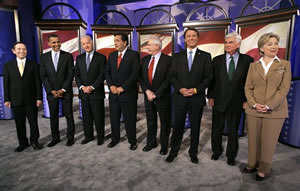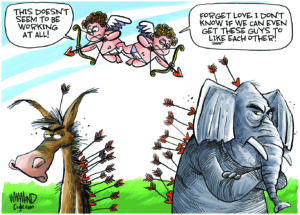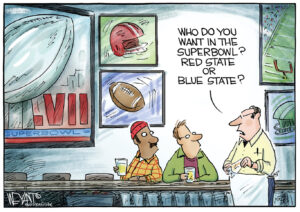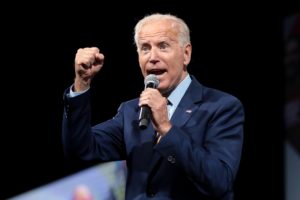Bridging the Democratic Divide
If a Democrat wins the next presidential election, she or he will have to tackle battles abroad -- and, no less significantly, at home. Boyarsky predicts that, after ending the Iraq war, a Democratic president would "immediately be confronted with domestic issues that have no Democratic consensus, issues in which debate is charged with deep feelings about national, ethnic and racial identity."
Once the war is over, liberals will face the messy and so-far insoluble matters of race, class and the poor.
I’m not predicting peace, or some approximation of it, soon. It’s unlikely the war will end quickly, even if the Democrats win the presidency. At the Democratic debate on ABC Aug. 19, New Mexico Gov. Bill Richardson talked about removing all of our troops in six to eight months. John Edwards promised nine or 10 months. Sen. Joseph Biden said withdrawal would be long and complicated, made difficult by concerns over the safety of troops, preservation of equipment and responsibility for contractors and other civilians. Sens. Hillary Clinton and Barak Obama agreed with Biden.
Don’t ask me exactly what Mike Gravel and Rep. Dennis Kucinich said. Moderator George Stephanopolous gave prime time to the front-runners. Even though Kucinich said he had prayed to God that Stephanopolous would call on him, the Lord made the congressman wait a considerable time.
But eventually, if a Democrat is elected president, we can count on the war dragging to a messy, painful conclusion. As Edwards said, “Any Democratic president will end the war.”
Opposition to the war has unified the Democrats. It was the most important issue in the Democratic takeover of the Senate and House last year. The war will loom at least as large in next year’s presidential and congressional races.
But the Democrats have to start planning their postwar strategy now. For if they win the election and stop the war, they will immediately be confronted with domestic issues that have no Democratic consensus, issues in which debate is charged with deep feelings about national, ethnic and racial identity.
The ideological split among Democrats was revealed in a poll taken in March by The Pew Research Center for the People & The Press. The survey found that 45 percent of Democrats and independents who lean Democratic say they are ideologically moderate, compared with 31 percent who say they are liberal. In Oklahoma, Alabama and Arkansas, conservative Democrats outnumber liberals. In Georgia, North Carolina, Texas and Missouri, there is a roughly even split.
One manifestation of this division seemed to come out in the national debate over the failed immigration bill. The bill’s main feature was to offer illegal immigrants a long and difficult path to citizenship, a far cry from the amnesty that its opponents feared.
Democrats and Republicans killed the bill for a variety of reasons. But whatever their reasons for opposing the measure — introduced by Democrat Ted Kennedy and Republican John McCain — the ambivalent feelings of many Democrats toward immigrants played a part. The Pew poll showed a certain Democratic hostility toward immigrants. About half of Democrats who consider themselves moderate believe that the growing number of immigrants endangers American customs.
Last year’s immigrant rights marches, in which some demonstrators carried Mexican flags, intensified the hostility. I got a taste of it earlier this year when I wrote a piece for Truthdig supporting the bill. I was surprised by the large number of critical comments, some of them noteworthy for their toxic attitude toward immigrants.
The issue will come up again. The Bush administration’s surprise raids on workplaces certainly aren’t a cure. Neither is building a border fence — nor sending immigration agents to arrest people like Elvira Arellano, an illegal immigrant and mother of an 8-year-old who is a citizen because he was born in the United States. She took sanctuary in a Chicago church and then was arrested in Los Angeles, where she had gone to speak about immigration reform.
When Los Angeles Mayor Antonio Villaraigosa discussed Arellano’s deportation to Mexico, he foreshadowed the expected demands of pro-immigrant members of Congress. “Until we resolve the status of the estimated 12 million undocumented people living and working in the United States by giving them some meaningful pathway to citizenship, families will continue to be torn apart,” he said.
African-Americans as well as Latinos will press for ways for the poor of their community to move up the economic ladder. It won’t be easy. A total of 42 percent of Democrats disagreed with this statement in the Pew poll: “We should make every possible effort to improve the position of blacks and other minorities even if it means giving them preferential treatment.” And 35 percent of Democrats said the nation has gone too far in pressing for equal rights.
Then there’s an unscientific but powerful measure of public opinion — comments on the Internet and talk radio and in interviews on the street and in bars, malls and coffee shops. This is especially noticeable when there has been a news event with racial implications. Then the national divide is clear. I saw that when I was covering the O.J. Simpson trial for the Los Angeles Times a decade ago, answering questions in our early-day online chat room, talking to readers on the phone and interviewing blacks and whites. Comments were so divided by race that I didn’t see how we’d ever come together. The same sort of reaction on sports talk radio and in chat rooms has been provoked by the story of Michael Vick, the African-American quarterback who announced he will plead guilty to federal dog fighting charges.
It will take great leadership and guts for a Democratic president and Congress to find its way through the party’s divided base.
But there’s hope if the Democrats propose and push through a national health insurance program first thing in 2009. A national health insurance program would reach across the racial divide. True, it won’t be a panacea. Great Britain’s national healthcare hasn’t prevented that country’s increasing racial tensions.
But medical care and health would improve in this country, and so would the quality of life. A healthy kid from a poor family has a much better chance of doing well in school than a sickly one who has suffered from scanty care in emergency wards. A healthy kid has a better chance of graduating from high school and college, the best path in America for equality.
The Democrats pretty much agree on medical care. All they have to do is beat the insurance and drug companies. That may prove easier than smoothing over the great divide on emotional issues that touch on race and ethnicity.
Your support matters…Independent journalism is under threat and overshadowed by heavily funded mainstream media.
You can help level the playing field. Become a member.
Your tax-deductible contribution keeps us digging beneath the headlines to give you thought-provoking, investigative reporting and analysis that unearths what's really happening- without compromise.
Give today to support our courageous, independent journalists.






You need to be a supporter to comment.
There are currently no responses to this article.
Be the first to respond.